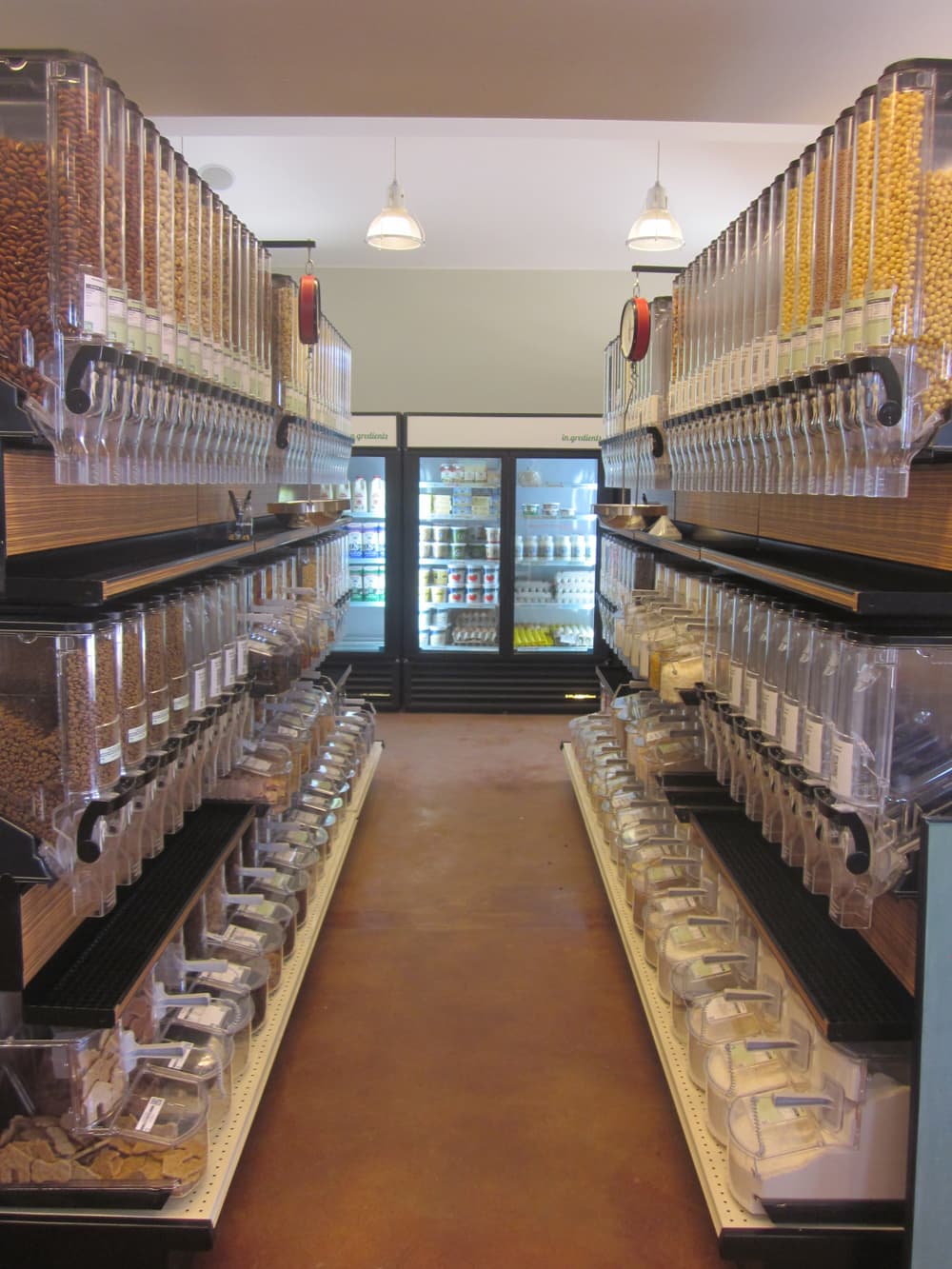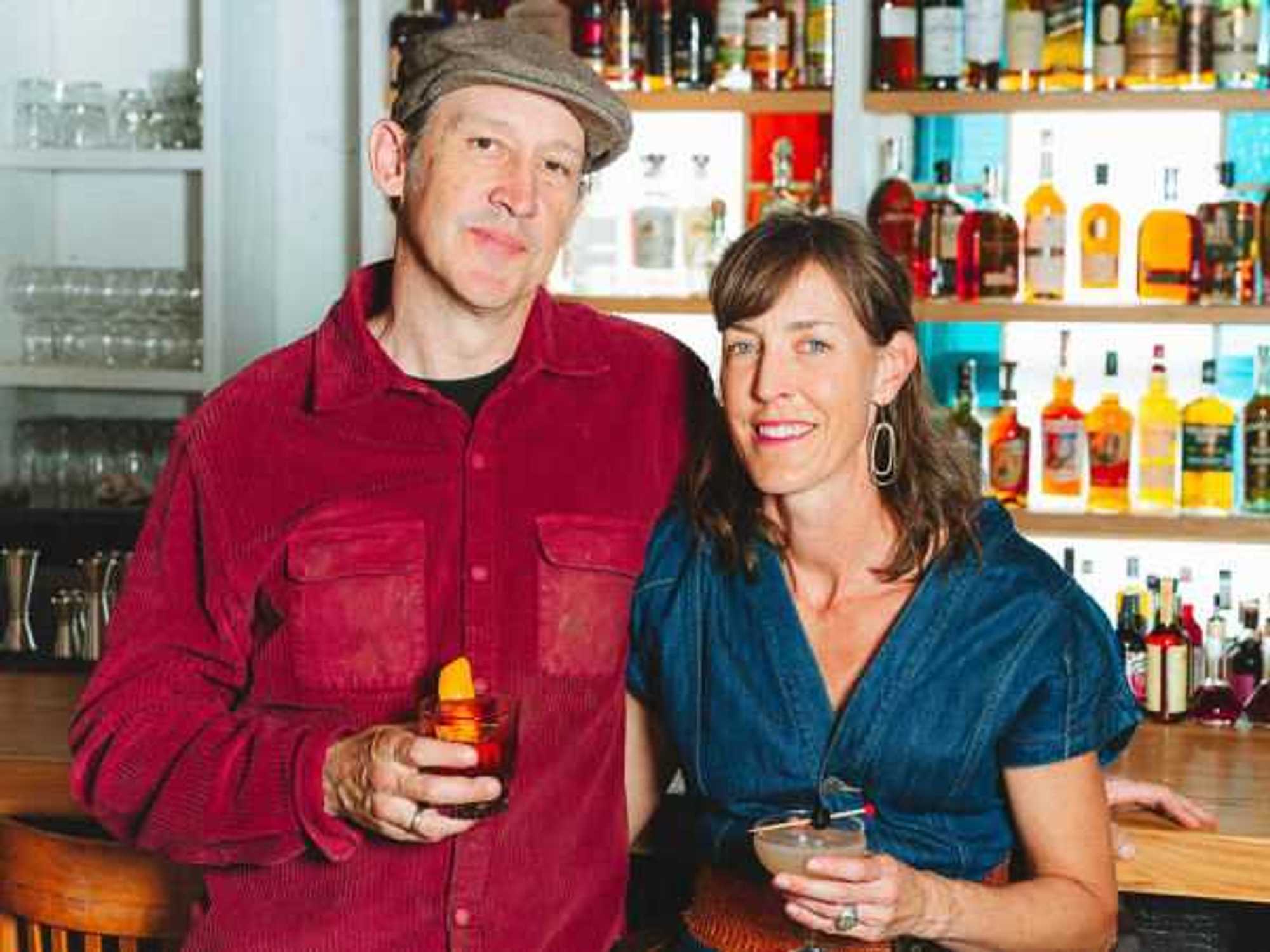Waste Not, Want Not
in.gredients: The first ever zero-waste grocery store is revolutionizing howAustin eats
 Photo by: Adam Sparks
Photo by: Adam Sparks Photo by: Adam Sparks
Photo by: Adam Sparks Photo by: Adam Sparks
Photo by: Adam Sparks Phksto by: Adam Sparks
Phksto by: Adam Sparks
Think fast. What are the seven main ingredients in your average frosted brown sugar cinnamon Pop Tart?
If you guessed enriched flour, brown sugar, soybean and palm oil (with TBHQ for freshness), corn syrup, dextrose, high fructose corn syrup and cracker meal, then pat yourself on the back. If you guessed "magic," then you're also fairly close. It's no stretch to say that the ingredients more closely resemble a chemistry experiment than a list of edible foods.
As a food writer who grew up in the 90s, there's nothing easier than making fun of the highly processed — often neon pink — junk food that made up my daily diet as a child. Who doesn't get a laugh out of the fact that Yoo-hoo must refer to itself on the bottle not as chocolate milk but as "Chocolate Drink"? With 22 ingredients per bottle, you're not exactly getting pure wholesomeness.
Yes, eggs are displayed for sale individually on a pallet, but that's only possible because the eggs came from a few blocks away. The beef? It comes from Taylor, TX, making it one of the farthest traveled item in the store (still under an hour's drive).
It's time for America to rethink its eating habits, starting with ingredients that make up the food we eat. in.gredients, the new "micro-grocery" on Manor Rd., is addressing this issue, without the added use of TBHQ for freshness.
The majority of the hoopla surrounding the store's opening (you know you have a good business idea when the New York Times covers your store over a year before you actually open) has centered around the fact that in.gredients is America's first zero-waste, package free grocery store.
Yes, they have peanut butter, but no, it doesn't come in a jar. You bring your own jar (or buy a glass jar there) and fill it up with as much or as little peanut butter as you like.
In reality, in.gredients is America's first 92% zero-waste, package free grocery store, due to local and statewide restrictions — you can't sell tilapia, meat or dairy in a tub, because they are highly susceptible to pathogens. Still, the folks behind in.gredients are true believers in being zero-waste, and the few roadblocks keeping them from being 100% waste free are seen merely as challenges to overcome.
But in.gredients' true revolution lies elsewhere.
Yes, eggs are displayed for sale individually on a pallet, but that's only possible because the eggs came from a few blocks away. The beef? It comes from Taylor, TX, making it one of the farthest traveled item in the store (still under an hour's drive). The okra is from the garden out front, just twenty feet away. In short: Every single food item for sale at in.gredients is from Austin or Central Texas.
Think fast! When is broccoli season? Where can you find local apples that haven't been shipped from New Zealand? These are the sorts of questions that in.gredients wants you to be asking. Brian Nunnery, public face of the grocery and its first manager, can't seem to get around the word "education" when describing in.gredients' mission.
“A lot of what in.gredients is doing is a mindset shift from what is normal in America," says Nunnery, whose bright-eyed confidence and friendly demeanor are shared by the store's employees. Nunnery wants to educate people about how food really works, about "what food really is." The secret? Pure ingredients. Real food, made in real ways.
“It’s one thing for a store to sell local food and to feel good about sourcing food from a local farmer, sustainably, ethically and selling a good product. But it’s another thing for them to do that and market that, but also sell seven types of completely unethically sourced meat at really low prices, incentivizing the customer to buy the worst option. That’s true across the board.”
"Almost every time, the worst choice is the best choice [at traditional supermarkets], if you buy into the prevailing logic."
Shopping at in.gredients is a curated affair. Every food item has been hand selected by the staff, and there's an unmistakable pride when it comes to the sourcing of their products. Each bin of food is labeled with the name of the producer, nutrition info and a custom made QR code. Scan the item on your phone and you'll get the producer's website, Twitter feed, Facebook account, relationship status and last decade of tax records (or something like that).
Your general grocery will run market research to see which brands customers want to buy, and then they will put those brands on the shelf. There is little to no quality control process, only economics. in.gredients, on the other hand, takes pride in its offer.
“We don’t have 67 types of yogurt. We don’t have 105 types of cereal. We’ve condensed things because we believe in the integrity of what we sell," says Nunnery with a jaunty air. "We have one kind of baking soda, and it’s excellent.”
A grocery store that is proud of its products — a store that refers to itself as "we" — in.gredients represents how food used to be, in the days before cartoon leprechauns sold marshmallow cereal to kids. in.gredients can also be the future of food, if we are ready for it.
Ultimately, I wonder if we are. Just about the size of your local convenience store, in.gredients could be much more aptly described as in inconvenience store. The system works incredibly simply, but Americans just aren't used to bringing our own bottles to shop. We're used to having the convenience of throwing away a bottle, a can, a plastic container, a wrapper. In other words, it's not you, in.gredients, it's me.
But think about what in.gredients is trying to achieve. Rarely, if ever, does a commercial establishment ask us to change our behaviors. Rarely does one ask us to educate ourselves before buying its product. Rarely do producers care enough about their product to put philosophy over product.
Who will succeed if in.gredients succeeds? We will. Austin will. Johnson's Backyard Garden will succeed, as will Tecolote Farm out in Manor. Our landfills will become smaller, as will our waistlines (hopefully). We'll eat less pesticides, eat less preservatives and not require food to be shipped half way across the world on a gas guzzling cargo ship just so that we can eat tomatoes in February.
And, in addition, the Austin food scene will introduce a new movement that holds just a little more gravitas than food trucks.
So maybe it's time for us to change our behaviors. Maybe things have become a little too convenient. I'll be the first to admit that it will take some effort to work in.gredients into my grocery routine, but the payoff is worth it. Nunnery knows that the model is a unique one, one that will take some getting used to.
"It’s good for people to be skeptical. I want people to be skeptical about what we’re doing. It’s a very new thing," he says. "We’ve tried to be really open about the fact that no one’s ever done this before. Give us feedback and we’ll adapt as we go along."
---
in.gredients is located at 2610 Manor Rd. For more information, visit in.gredients.com.

 Warm wood covers the interior of Boni's Bar Next Door. Photo by Chad Wadsworth
Warm wood covers the interior of Boni's Bar Next Door. Photo by Chad Wadsworth